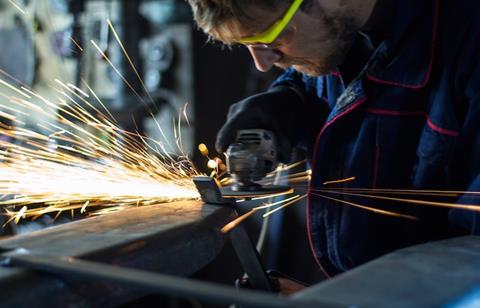
More than 15,000 metalwork and electrical employees based in Germany who are members of the trade union IG Metall have undertaken strike action in a dispute over pay and work-life balance.
Affected IG Metall members, who work across 80 different organisations, undertook strike action yesterday (Monday 8 January 2018) after negotiated collective agreements and the agreed peace obligation expired on 31 December 2017.
The dispute regards IG Metall members who work in the metal and electrical sector seeking a 6% increase in pay and training allowances, as well as the entitlement to reduce their weekly working hours to 28 hours a week for a total period of up to two years. After this period, employees would be able to automatically return to full-time employment.
Employees who reduce their working hours in order to care for children under the age of 14 or for family members should be entitled to receive a fixed grant of €200 (£176.27) if they reduce their weekly working hours by at least 3.5 hours or more, according to IG Metall’s proposal. Furthermore, employees performing shift work or other forms of work that may be harmful to their health who take-up the option to reduce their working hours should also be entitled to a remuneration subsidy of €750 (£661.03) a year.
During the industrial action, more than 4,000 employees from across eight organisations took part in strikes in Baden-Wurttemberg, and a further 3,000 employees rallied at the Porsche Museum. Further strike action took place at Berlin-Brandenburg-Sachsen, Lower Saxony, Saxony-Anhalt, North Rhine-Westphalia and in Bavaria, affecting organisations such as Otis, Borsig, KB Powertech, Robert Bosch Steering, and Magna Exterior Systems.
The industrial action this week follows on from strikes conducted last Thursday and Friday (4 and 5 January 2018), where approximately 6,000 employees participated in the industrial action.
IG Metall initially confirmed its pay and reduced hours proposition after a board meeting held in Frankfurt in October 2017. Its negotiations were also agreed to discuss compensation arrangements, paid time off for exams for apprentices and dual students, and achieving a reliable negotiation obligation process for tariff areas in eastern Germany, in order to discuss pay, working hours and working conditions.
At this time, Jorg Hofmann, first chairman at IG Metall, said: “This demand takes into account the excellent economic situation in the industry; it strengthens domestic demand and contributes to the stabilisation of the economy.
“The goal is more self-determination in working hours. The flexibilisation of working hours in [organisations] must not continue to be one-sided at the expense of the employees, they must also use them. Anyone who refuses to use modern working hours as an employer today will be without an employee tomorrow.”









![[FisherA]_portrait_web_crop_newstyle](https://d1m12snq5oxhll.cloudfront.net/Pictures/100x67/9/2/6/108926_fishera_portrait_web_crop_newstyle_714878.jpg)

